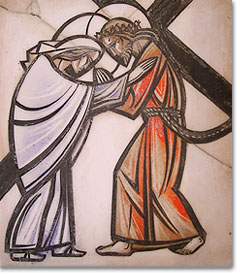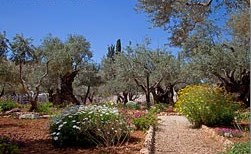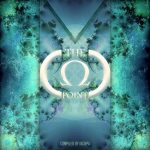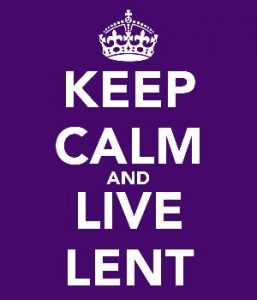 I hope that I die during the Easter Season. Then there may be a chance that the liturgy would include the Easter account of the two persons journeying to Emmaus, hearing a Stranger talk to their hearts “burning within” them, and then recognizing the Christ in the breaking of the bread. There’s hardly a story in Scripture that fascinates and excites me more. The plot is fashioned for suspense. The dialogue reveals character. The setting carries the story along. And the denouement? Awesome!
I hope that I die during the Easter Season. Then there may be a chance that the liturgy would include the Easter account of the two persons journeying to Emmaus, hearing a Stranger talk to their hearts “burning within” them, and then recognizing the Christ in the breaking of the bread. There’s hardly a story in Scripture that fascinates and excites me more. The plot is fashioned for suspense. The dialogue reveals character. The setting carries the story along. And the denouement? Awesome!
To the untrained eye, a newly-tilled garden is just a patch of ground, but the gardener sees soil replete with moisture, nutrients, air, and living organisms. To the gardener the soil is a living thing. A gardener touches, smells, and remembers the soil’s past history to capitalize on the wealth stored there. To the gardener, an ordinary patch of ground can be rich soil.
 Jesus spoke of rich soil as a metaphor of our lives of faith. Even in rich soil the yield may be only thirty- or sixty-fold. Apparently Jesus was quite satisfied with the thirty-fold, for he understands that the soil may be rich, but other factors can prevent the yield. This is true of our spiritual lives, too. God has given each of us the gift of faith, requiring response. Just as gardens vary from year to year in their yield, our response to God varies, too. We pray with fruitfulness one year, with dryness the next. Our deeds of charity may tower like sunflowers this year, but creep like ground-cover next year. Our involvement may be as inconspicuous as a lily of the valley now, but change the circumstances and our ministry may reach heavenward like hollyhock. God understands our efforts and our yield. Even faith’s tiniest yield is stormed in the Kingdom, where all is becoming the hundredfold in God’s design.
Jesus spoke of rich soil as a metaphor of our lives of faith. Even in rich soil the yield may be only thirty- or sixty-fold. Apparently Jesus was quite satisfied with the thirty-fold, for he understands that the soil may be rich, but other factors can prevent the yield. This is true of our spiritual lives, too. God has given each of us the gift of faith, requiring response. Just as gardens vary from year to year in their yield, our response to God varies, too. We pray with fruitfulness one year, with dryness the next. Our deeds of charity may tower like sunflowers this year, but creep like ground-cover next year. Our involvement may be as inconspicuous as a lily of the valley now, but change the circumstances and our ministry may reach heavenward like hollyhock. God understands our efforts and our yield. Even faith’s tiniest yield is stormed in the Kingdom, where all is becoming the hundredfold in God’s design.
Divine Gardener, sow your message deep within me that I may yield a hundredfold harvest of love.
 The eyes of Jesus and Mary met for a fleeting moment on the via crucis. Because Mary and Jesus loved immensely, they could encourage the other forward through the streets toward Calvary. They knew the present kenosis (self-emptying) would hollow them to receive the greatest capacity possible for God’s life and love, although such thoughts were smothered in the feelings of utter abandonment, dread, and excruciating emotions and physical pain. Jesus allowed Mary to share his pain. It nearly broke her, but Mary continued to Calvary where she stood beneath the cross. The scene surrounding Jesus and Mary was horrific: the sound of whips and hammering nails, the jeers, the shouts of “Crucify!’ Yet what Jesus and Mary felt in their hearts toward each other, in that empathetic moment when their eyes met, conveying they would gladly have taken on the other’s pain, their hearts held unsurpassed beauty.
The eyes of Jesus and Mary met for a fleeting moment on the via crucis. Because Mary and Jesus loved immensely, they could encourage the other forward through the streets toward Calvary. They knew the present kenosis (self-emptying) would hollow them to receive the greatest capacity possible for God’s life and love, although such thoughts were smothered in the feelings of utter abandonment, dread, and excruciating emotions and physical pain. Jesus allowed Mary to share his pain. It nearly broke her, but Mary continued to Calvary where she stood beneath the cross. The scene surrounding Jesus and Mary was horrific: the sound of whips and hammering nails, the jeers, the shouts of “Crucify!’ Yet what Jesus and Mary felt in their hearts toward each other, in that empathetic moment when their eyes met, conveying they would gladly have taken on the other’s pain, their hearts held unsurpassed beauty.
“I formed you, and set you as a covenant of the people, a light for the nations, to open the eyes of the blind, to bring out prisoners from confinement, and from the dungeon, those who live in darkness.” (Isaiah 42:6b-7)
Imagine God reading Isaiah 42:1-7 to you to remind you that you were formed to be a light for the nations. A tall order, but you can do it, because the Lord is your light and salvation (psalm 27). God will shine through you, because God needs you. God needs your knowledge, skills, personality, talents to build up the earth. God plans through our thoughts and feelings to achieve the aim of creation: to bring all into one in love.
Sometimes we think God’s will is floating in cyberspace, and unfortunately there’s no app to know God’s will. But God wants us to be part of the plan. The plan (God’s will) is co-created through the exercise of our own hearts and minds. Actually God’s plan needs our own best thinking. When we’re prayerful people, God speaks to us in our own voice; in other words, God’s thoughts are our thoughts. This means that when we ask “Which way, God?” the answer is God’s ways are our ways. Wow! Although we can do nothing without God, God still works through us for the redemption of the world by our own activity. Cooperating with God is grace and blessing. God wants us to get involved, aim toward union with others, and help all creation come to its best fulfillment. Some call this “christifying” the world through our own actions or “going to heaven through earth.”
 As we begin Holy Week, be open to God who speaks through your own person. Be like Martha who did what she did best for Jesus by preparing a meal. Be like Mary who did what she did best for Jesus by anointing Jesus’ feet. Be like Jesus who kept heading toward Jerusalem.
As we begin Holy Week, be open to God who speaks through your own person. Be like Martha who did what she did best for Jesus by preparing a meal. Be like Mary who did what she did best for Jesus by anointing Jesus’ feet. Be like Jesus who kept heading toward Jerusalem.
How does God shine through you best? How can you be a light to the nations?
How can you use the opportunities of this Holy Week to “christify” the world?
Loving God, I give you my hands, heart, and voice today to aid you in your plan to bring about a world united in love. Give strength to my hands to serve, give your Spirit to my heart to love, and give courage to my voice to speak your words of truth. I ask this through your Son, our Lord Jesus Christ, who allowed someone to wash his feet as a sign of comforting encouragement as he set out for his death in Jerusalem.
After an unusually harsh winter the spring thaw may make us more eager than ever to plant a garden. Gardening gives us many metaphors for salvation history and our own spiritual lives. Our human history began in the Garden of Eden, a microcosm of the Garden of All Creation. In the beginning all was beautiful, but we foiled God’s plan, and the New Creation needed to be restored in the New Adam.
 Jesus Christ was no stranger to gardens. On the night before he died he agonized in the Garden of Olives. He was mistaken for a gardener on Easter Sunday morning. The death-resurrection-ascension-sending of the Spirit oriented all creation to Jesus Christ. All is now “in Christ.” We are grafted to Christ by baptism like vine and branch. With all creation we await the fullness of redemption that we have been promised. In the end the tree in the primeval garden (Gn. 2:9) will blossom in “the tree of life which grows in the garden of God” (Rev. 2:7). Salvation is from garden to garden.
Jesus Christ was no stranger to gardens. On the night before he died he agonized in the Garden of Olives. He was mistaken for a gardener on Easter Sunday morning. The death-resurrection-ascension-sending of the Spirit oriented all creation to Jesus Christ. All is now “in Christ.” We are grafted to Christ by baptism like vine and branch. With all creation we await the fullness of redemption that we have been promised. In the end the tree in the primeval garden (Gn. 2:9) will blossom in “the tree of life which grows in the garden of God” (Rev. 2:7). Salvation is from garden to garden.
O God, our Good Gardener, prune whatever needs to be taken from me so that I may nurture the seeds of your life in me. Journey with me, O God, toward the fullness of the Kingdom when “earth’s harvest is fully ripe” (Rev. 14:15).
 “What paralyses life is lack of faith and lack of audacity” (Teilhard de Chardin). Audacity: a great thing to have in yourself, but others probably won’t like it. The world’s most influential people were audacious: Mahatma Gandhi, Clara Barton, the signers of the Declaration of Independence, Paul Revere, Dietrich Bonhoeffer, Harriet Tubman, Martin Luther King, Jr.—and the list goes on.
“What paralyses life is lack of faith and lack of audacity” (Teilhard de Chardin). Audacity: a great thing to have in yourself, but others probably won’t like it. The world’s most influential people were audacious: Mahatma Gandhi, Clara Barton, the signers of the Declaration of Independence, Paul Revere, Dietrich Bonhoeffer, Harriet Tubman, Martin Luther King, Jr.—and the list goes on.
With Lent half over the day’s readings from the lectionary show Jesus more and more audacious. In John 7 we hear Jesus teaching in the temple area: “I was sent by One who has the right to send, and him you do not know. I know him because it is from him I come: he sent me.” We can imagine the hearers thinking, “How audacious! Even blasphemous! Get him out of this sacred space!” Yet Jesus persists in his claims to be what he is. We know the result: crucifixion.
Are we known for our audacity for good, for truth, for justice? Do we feel somewhat paralyzed in the face of evil?
Lord Jesus, Audacious One, give us your courage to enlarge our souls and grow into the audacity needed to proclaim your Kingdom.
“Sing out, O heavens, and rejoice, O earth, break forth into song, you mountains. For the Lord comforts his people and shows mercy to  his afflicted.”
his afflicted.”
We’re about three-fourths of the way through Lent, when Lenten resolutions may be harder to keep. Today’s First Reading telling us to sing and rejoice sounds like the Exsultet at the Easter Vigil. Its hint of Easter spurs us on. Lent, a season of preparation, would be meaningless without Easter. Moreover, every day we’re heading toward what Teilhard de Chardin calls the Omega Point where all will be one in the resurrected Christ, the cosmic Christ. It’s a good day to realize that no matter what the pain or sorrow, no matter how drab the day, no matter how dismal we may feel, there is always Easter. For Easter is not just a day, not even a whole season. Easter is every second of every day, because we live in the resurrected Christ. So do some rejoicing today! Catch a whiff of spring just two days away
“Kind words can be short and easy to speak, but their echoes are truly endless” (Mother Teresa). Do you remember some kind words spoken to you years ago? Perhaps they changed your outlook and attitude, or even the direction of your life. Today is an opportunity to speak or write kind words. Will we use this opportunity or waste it? Be creative in your words. Instead of “Have a nice day” try “Have a  blessed day.” Instead of a perfunctory thank-you to a cashier, give a sincere compliment about the service. If you’re a teacher, take the time to write words of affirmation on papers. If you’re a wife or husband, put a loving note in a place where it will be found. In our age of texting when whole sentences are reduced to a few letters, give some extra thought to whatever you write today. The echoes may be endless.
blessed day.” Instead of a perfunctory thank-you to a cashier, give a sincere compliment about the service. If you’re a teacher, take the time to write words of affirmation on papers. If you’re a wife or husband, put a loving note in a place where it will be found. In our age of texting when whole sentences are reduced to a few letters, give some extra thought to whatever you write today. The echoes may be endless.
Mahatma Gandhi stated, “We must become the change we want to see in the world.” Lent and New Year’s Day are the traditional times  to consider change. It’s easy to see that our world must change. We can’t continue polluting the air and water, we can’t keep killing one another, we can’t keep letting the poor become poorer, we can’t keep closing our borders to refugees and immigrants. But what can one person do in the face of world problems? I can recycle and reuse, I can become politically involved, I can participate in organizations that make my town and world better. I can become the change I want to see.
to consider change. It’s easy to see that our world must change. We can’t continue polluting the air and water, we can’t keep killing one another, we can’t keep letting the poor become poorer, we can’t keep closing our borders to refugees and immigrants. But what can one person do in the face of world problems? I can recycle and reuse, I can become politically involved, I can participate in organizations that make my town and world better. I can become the change I want to see.
 Lent is three days old, and I’m already feeling weak about my Lenten resolutions. That’s no surprise, but it is surprising that the Gospel for today suggests that all that fasting and discipline aren’t always the best things. Jesus’ disciples aren’t fasting, and Jesus defends them. No one fasts or mourns at a wedding, so why should disciples do penance when they’re in the midst of their Master? With God in our midst it is always a time for rejoicing.
Lent is three days old, and I’m already feeling weak about my Lenten resolutions. That’s no surprise, but it is surprising that the Gospel for today suggests that all that fasting and discipline aren’t always the best things. Jesus’ disciples aren’t fasting, and Jesus defends them. No one fasts or mourns at a wedding, so why should disciples do penance when they’re in the midst of their Master? With God in our midst it is always a time for rejoicing.

